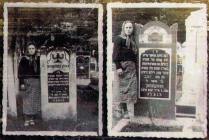| strona główna | cmentarze | warto wiedzieć | księga gości | napisz do nas |
| TUSZYN | |||||||||||||||||||||||||||
According to Wladyslaw Okas' book "From history of Tuszyn. Calendar", the Jews of Tuszyn are first mentioned in 1660. Prior to their arrival, the Swedish army destroyed the town in 1655. We can suppose at that time the owners of Tuszyn invited Jews to settle in the town in order to develop the economy. In 1683, additional Jews arrived and bought property and houses. In 1781, eighty-six Jews were recorded as living in Tuszyn. Very shortly afterwards, the Jews began to regulate and control the craft and trade of the town. Their increasing position in the development of the town brought about resentment from the Christian segment of the population. One of the greatest problem was the right to produce and sell alcohol. This was an industry which was handled by the Jewish residents. The Jewish participation in the economy of Tuszyn is illustrated in the following statistics, reflecting the structure of different work groups in 1849: tailors: 21 people (all Jews), blacksmiths: 10 people (no Jews), tanners: 5 people (all Jews), bakers: 8 people (6 Jews), cobblers: 11 people (no Jews). The Jews benefited by the discovery of natural sources of mineral water in Tuszyn. Some members of the Jewish community arranged transportation and accommodations for visitors coming to the spa. As in many other towns throughout the region, the 19th and 20th centuries brought an era of dynamic growth of Jewish population. In 1831, 350 Jews lived in Tuszyn; in 1882, the number rose to 1.248. The Jewish community of Tuszyn already had already established its own synagogue, hospital and three prayer houses. Chasidism had many followers. The most popular Jewish surnames in Tuszyn were: Adler, Blady,Cola, Fuks, Goldsztajn, Hecht, Fryd, Przedborski and Szwarc. |
|||||||||||||||||||||||||||
|
|||||||||||||||||||||||||||
It is worth noting that the famous Jewish painter Jankiel Adler (1895-1949) came from Tuszyn. Jankiel Adler was one of the best artists in the first part of the 20th century. He created such paintings as: "The Last hour of Rabbi Eleazer", "My Parents", "Jew with the book". For more information on J. Adler go to www.wikipedia.org. Jankel Adler died on the 25 April 1949 in his house Whitley Cottage, Castle Street, Aldbourne and was buried in London in the Jewish cemetery at Bushy Road. Click here to see a photo of his grave. During the Holocaust of World War II, Jews from Tuszyn were deported to the twon of Srock , and after that, to the ghetto in Piotrkow Trybunalski. Eventually, they were taken to concentration camps. |
|||||||||||||||||||||||||||
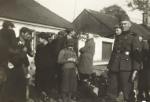 |
|||||||||||||||||||||||||||
| Deportation of Jews from Tuszyn. Author unknown, courtesy of www.bagnowka.com | |||||||||||||||||||||||||||
Jewish cemetery in Tuszyn is located in the district called "Tuszyn-Las" by 3 Maja Street. The older residents refer to the cemetery as "kirchol". At the end of 2011 one of very few Holocaust survivors from Tuszyn, Mr. Chaim Fuks sent us two old photos, taken in the cemetery at the end of the 30s. Photos show polychromed matzevot made of sandstone and a lane of trees in the background. The posing woman from the photos was killed in Treblinka a few years later. |
|||||||||||||||||||||||||||
Jewish cemetery in Tuszyn in 1937 or 1938. Photo from Chaim Fuks's collection |
|||||||||||||||||||||||||||
The cemetery was destroyed during the World War II. Today, the area is occupied by a holiday resort. Some of the gravestones can be found in different parts of the city. Below, photos of some matzevot are shown. These gravestones were from the turn of the 19th and 20th centuries, and were made from sandstone, which preserved traces of polychromy. text: K. Bielawski |
|||||||||||||||||||||||||||
Our sincere thanks to Marek Busiakiewicz for his precious help. |
|||||||||||||||||||||||||||
 |
 |
 |
 |
||||||||||||||||||||||||
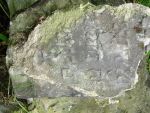 |
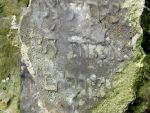 |
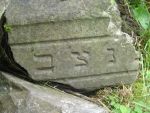 |
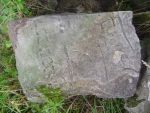 |
||||||||||||||||||||||||
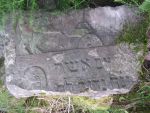 |
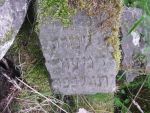 |
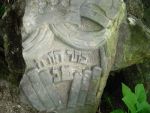 |
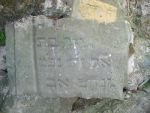 |
||||||||||||||||||||||||
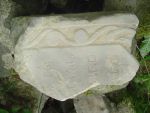 |
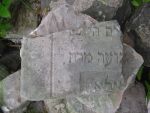 |
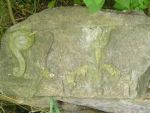 |
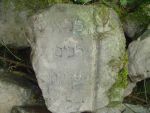 |
||||||||||||||||||||||||
We look forward to receiving any information about Jews from Tuszyn and their cemetery. We are also awaiting more information from people who remember the cemetery from times before World War II.. |
|||||||||||||||||||||||||||
 |
|||||||||||||||||||||||||||
| The text and pictures are the property of the authors. To utilize this material it is necessary to obtain the written permission from the editor. |
|||||||||||||||||||||||||||
| strona główna | cmentarze | warto wiedzieć | księga gości | napisz do nas |

